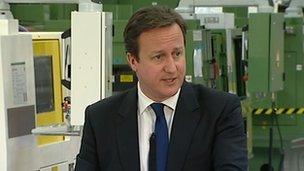Economy: There is no alternative (TINA) is back
- Published
- comments

She's back. She's not been heard of since the 1980s. She's been brought out of retirement by David Cameron. She is TINA - "There Is No Alternative" - the phrase forever associated with Mrs Thatcher in the 1980s.
Today her successor has revived it in a speech which, whilst revealing no new policies, reveals a great deal of the government's thinking and is clearly designed as a script for its supporters.
"If there was another way I would take it. But there is no alternative"
The key message of the speech is summed up in this sentence :
"The very moment when we're just getting some signs that we can turn our economy round and make our country a success is the very moment to hold firm to the path we have set"
At some length Cameron takes on the Labour argument that he has been cutting too fast and too deep insisting that there is no "magic money tree":
"There are some people who think we don't have to take all these tough decisions to deal with our debts. They say that our focus on deficit reduction is damaging growth. And what we need to do is to spend more and borrow more. It's as if they think there's some magic money tree. Well let me tell you a plain truth: there isn't. Last month's downgrade was the starkest possible reminder of the debt problem we face. If we don't deal with it interest rates will rise, homes will be repossessed and businesses will go bust…And more and more taxpayer's money will be spent just paying off the interest on our debts"
He takes aim at the Tory right's argument that he should cut taxes as this will pay for itself by stimulating growth.
"But most of the time tax cuts don't completely pay for themselves. Margaret Thatcher understood that a tax cut paid for by borrowed money is no tax cut at all when she said: 'I've not been prepared, ever, to go on with tax reductions if it meant unsound finance'
There are some hints of future policy announcements on making it easier for people to buy their own homes and on vocational education.
Perhaps most revealing, though, is that he feels the need to make this speech at all and who it is aimed at. It is a restatement of the government's central economic purpose aimed at:
his own party, which is why he is borrowing Margaret Thatcher's language
the North of England
and women
Look at this paragraph to see what I mean :
"I know things are tough right now. Families are struggling with the bills at the end of the month. Some are just a pay-cheque away from going into the red. Parents are worried about what the future holds for their children. Whole towns are wondering where their economic future lies. And I know that is especially true for people here in Yorkshire and in many parts of the north of our country who didn't benefit properly from the so-called boom years and worry they won't do so again. But I'm here to say that's not going to happen. Because we have a plan to get through these difficulties - and to get through them together."